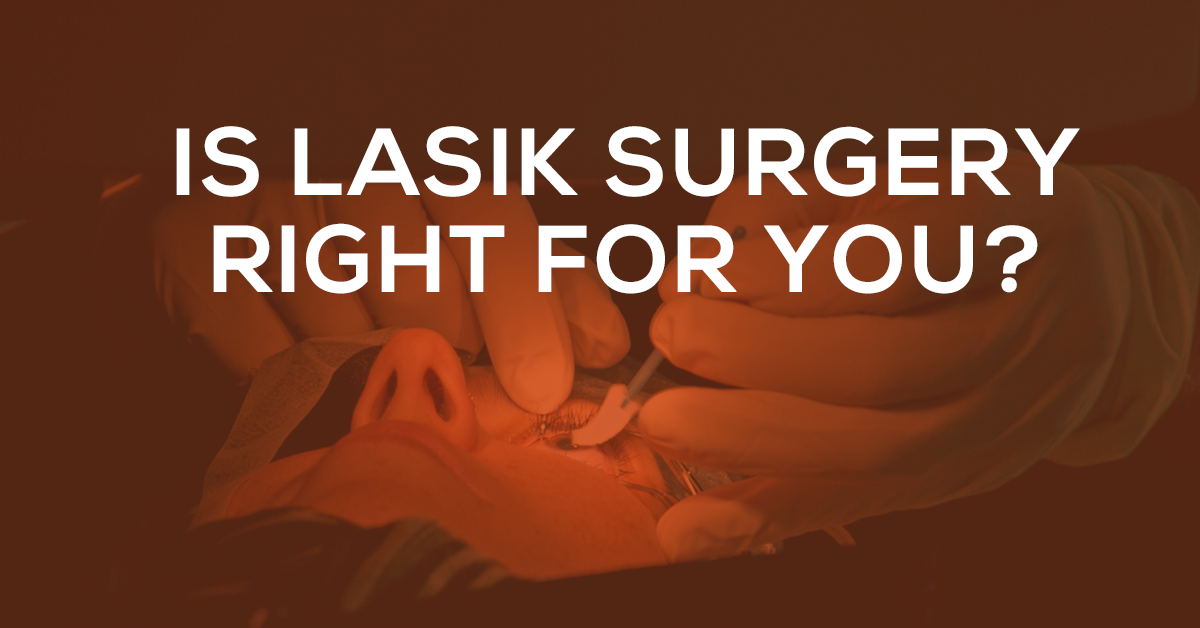¿Es la cirugía LASIK adecuada para usted?


Según el Vision Council of America, aproximadamente el 751% de los adultos en los Estados Unidos usan algún tipo de corrección de la visión. Más de la mitad de ellos (alrededor del 641% de los adultos) usan anteojos. Si usted es uno de los millones de estadounidenses que usan anteojos o lentes de contacto y está cansado de ellos, es posible que tenga la oportunidad de cambiar eso con LASIK.
LASIK (abreviatura de queratomileusis in situ asistida por láser) es una cirugía refractiva ocular. La cirugía refractiva ocular es un tipo de cirugía que corrige problemas comunes de la visión, como la miopía, la hipermetropía y el astigmatismo, y generalmente permite al paciente lograr una visión de 20/20 o mejor. Eso significa que ya no es necesario depender de anteojos o lentes de contacto (aunque algunos pacientes eventualmente tendrán que usar anteojos para conducir de noche o leer cuando sean mayores).
Aprobado por primera vez por la FDA en 1998, LASIK Por lo general, el médico utiliza un láser para remodelar la córnea debajo de la superficie. Por lo general, el cirujano fabrica un colgajo corneal superficial, que se dobla hacia atrás y se aplica el láser a las capas subyacentes de la córnea. LASIK También se realizan en los que no se utiliza ningún colgajo. El método sin colgajo de LASIK No es necesario realizar ningún corte en la córnea, sino que se elimina una capa de la córnea (llamada capa epitelial). El tipo de LASIK Lo necesario puede depender del tipo específico de problema ocular que experimente el paciente, y eso es algo que un cirujano ocular puede discutir con usted durante una consulta.
LASIK es una cirugía ambulatoria y todo el proceso generalmente se puede realizar en menos de 10 minutos. No solo es una cirugía rápida e indolora (la mayoría de los pacientes solo sienten una ligera presión, pero no dolor), sino que los pacientes generalmente también se curan rápidamente. La visión funcional generalmente regresa en cuestión de horas después de la cirugía, sin necesidad de puntos ni parches oculares, por lo que la mayoría de los pacientes pueden volver a trabajar y a sus actividades habituales al día siguiente. Y la mayoría de los pacientes (95%)LASIK Los pacientes informan una agudeza visual de al menos 20/40 y casi la misma cantidad logra 20/20 o más. Además, LASIK También puede ayudar a mejorar la visión periférica y la visión nocturna.
Con un riesgo de complicaciones tan reducido y un tiempo de recuperación tan rápido, ¿por qué no investigar? LASIKNo siga usando anteojos o lentes de contacto (y gaste cientos de dólares en ellos al año) si no es necesario. Dígale adiós a su dependencia de los anteojos. Llámenos hoy para programar una consulta con un miembro de nuestro experimentado equipo de médicos y descubra si LASIK La cirugía es la respuesta adecuada para usted.

